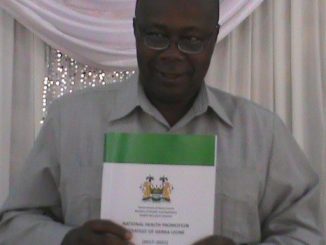
*SORIE’S COLUMN*
*PART 1*
*Sierra Leone Police to Account for Missing Millions of Leones*
The importance of upholding the law and maintaining integrity within the police force cannot be overstated. It is imperative that law enforcement agencies adhere to established regulations and guidelines to ensure fairness and transparency in their operations. However, in Sierra Leone, the integrity of the police force has come into question following the exposure of corruption in a recent Audit Report for the financial year 2023.
The Audit Report reveals significant inconsistencies between the payroll and staff list of the Sierra Leone Police for the fiscal year 2023. A thorough review of payroll vouchers and staff lists uncovered troubling findings. For instance, a total of 265 names on the payroll voucher could not be matched to the staff list, yet they were still paid a significant amount totalling NLe6,611,633.43 in FY2023. Furthermore, 461 staff members listed in the nominal roll were not accounted for in the payroll vouchers. These discrepancies indicate serious violations of Regulation 114(1) of the Public Financial Management Regulations, 2018. Shockingly, the audit report also reveals that seven staff members who had left the force either due to death, discharge, or retirement continued to receive salaries after their departure dates, totalling NLe130,475.18 in FY2023. This raises concerns about the existence of those individuals on the payroll, suggesting a potential case of ghost workers within the Police Force. In light of these findings, immediate action must be taken to investigate these inconsistencies and hold those responsible for corruption and mismanagement, to give account of their stewardship. The Parliament, in collaboration with the Anti-Corruption Commission must conduct a thorough investigation and prosecute any identified corrupt official who might have created the discrepancies in the payroll system and ensure that such unethical practices are eradicated from the Sierra Leone Police. Upholding the rule of law and maintaining public’s trust in law enforcement agencies is paramount for a just and fair society.
In another instance of corruption, the Audit Report brought to light the issue of recruitment procedures not being followed during the recruitment of 1100 Police Officers in 2023. It was revealed that essential documents such as interview records, police clearance, personal files, and the final shortlisted applicants list for Police Training School were missing. This raised doubts about whether the recruitment process adhered to the specified procedures outlined in the SLP Recruitment Policy 2014. The absence of proper documentation indicated that the recruitment process may not have been transparent, fair, and competitive. This lack of adherence to established procedures could have serious implications for the professionalism and credibility of the police force. Without a thorough and standardized recruitment process, there is a risk of appointing officers who may not have the necessary qualifications or character traits to serve effectively.
The fact that the public already lack trust in the Police Force only amplifies the significance of following proper recruitment procedures. When shortcuts are taken in recruiting new officers, it undermines the integrity of the entire institution and opens the door to criticism and scepticism from the public. The public expects law enforcement officers to embody professionalism, integrity, and a commitment to upholding the law, and any deviation from this expectation can erode public trust.
The police institution is not only responsible for providing security for the state but also for demonstrating accountability and discipline in its operations. The Sierra Leone Police is often viewed as engaging in human rights abuses, unprofessional behavior, and using its power as a political tool to suppress opposition members, lawyers, civil rights activists, and journalists in honouring of certain authorities. In instances where a security institution lacks financial and administrative integrity, it is evident that it poses a threat to public freedom and trust.




Leave a Reply